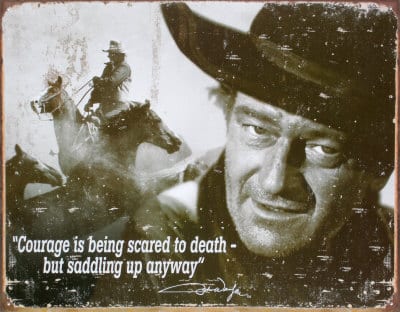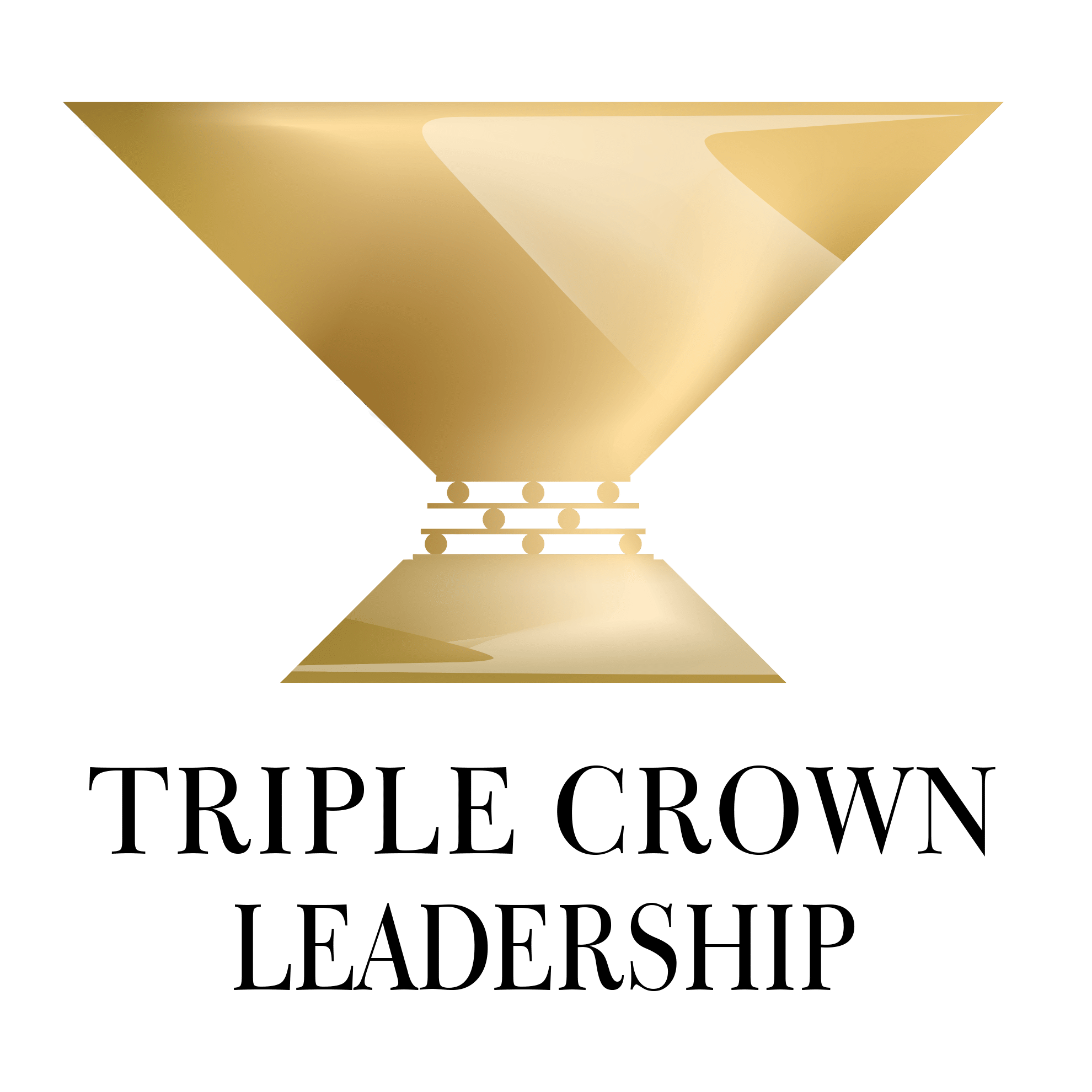Courage is essential for great leadership. Without courage, leaders can’t do the things they must do.
Courage is the mental and moral strength which helps us venture forth, confront danger, face our fears and challenges, and persevere.

Aristotle taught us that courage is the virtue that is at the center of—the “golden mean” between—foolhardiness (excessive courage) and cowardice (insufficient courage). There are different types of courage. We often think of physical courage but there’s also emotional, intellectual, social, moral, and spiritual courage.
These days, most of us don’t face enemies in battle or attacks from wild animals. Danger comes more often in mental, emotional, and social forms. We need courage to speak up when we believe something is wrong. (See our article, “Are You Strong Enough to Be a Voice of One?”) We might be mocked, excluded, or punished, but if we’re silent, we’re complicit.
Courage is rare in organizations because many people are conflict-averse and prone to avoiding difficult or awkward situations.

Courage as the “Backbone of Leadership”
Having the courage to act with integrity develops our character. People respect ethical leaders. In their excellent book, Courage: The Backbone of Leadership, Gus and Diane Elliott-Lee wrote:
“Life is demanding. Luckily, there is one quality that drives transformational leadership and personal and institutional success. That one quality is courage…. Courage is the single most decisive trait in a leader.”

Courage comes into play with organizational values. In their book, the Lees posit that there are three kinds of core values in organizations: low, middle, and high core values.
Low Core Values
They describe low values as common habits that are not best business practices. They cite examples such as favoritism, cliques, disrespect, misrepresentation, greed, ruthlessness, and even abuse and bribery.
Middle Core Values
They describe middle values as visible best business practices. We see them in many organizations. Examples they cite include quality, teamwork, honesty, service, loyalty, innovation, and customer focus.
“…most organizations state high or theoretical values for public consumption and then privately ignore them. Tyco’s values, as it practiced historic grand larceny, were integrity, excellence, teamwork, and accountability.”
-Gus and Diane Elliott-Lee, Courage: The Backbone of Leadership
Middle values are good, no doubt, but the Lees warn that they can seduce leaders into thinking they’ve achieved genuine excellence when they haven’t. One reason is that values are too often ignored in organizations, leading to frustration and cynicism. A second reason is that middle values are only the byproducts of high core values. (They say it’s okay for organizations to adopt medium core values but only if they’re accompanied by at least one high core value.) So what, then, are high core values?
High Core Values
High core values are the highest principles—the “platinum standard,” they write, “in a world that likes to trade in tin.” According to the Lees, there are only three high core values:
These three high core values are related. Maintaining one’s integrity often takes courage. Also, leaders who demonstrate courage and integrity over time build character.

Leadership Derailers Assessment
Take this assessment to identify what’s inhibiting your leadership effectiveness. It will help you develop self-awareness and identify ways to improve your leadership.
The Primacy of Courage in Leadership
Other noted authors and leaders over time have spoken of the preeminence of courage in leadership:
- “The great need for anyone in authority is courage.” -Alistair Cooke, British-American writer
- “…courage is the enforcing virtue, the one that makes possible all the other virtues common to exceptional leaders: honesty, integrity, confidence, compassion, and humility. In short, leaders who lack courage aren’t leaders.” -John McCain, former U.S. Senator and Navy veteran
- “You gain strength, courage, and confidence by every experience in which you really stop to look fear in the face. You must do the thing which you think you cannot do.” -Eleanor Roosevelt, former First Lady, diplomat, and activist
- “Success is not final, failure is not fatal: It is the courage to continue that counts.” -Winston Churchill, former British Prime Minister
What Courageous Leadership Entails
Courageous leadership entails many things, including:
- stopping ourselves when we’re about to do something wrong
- challenging others when they’re about to do something wrong
- setting boundaries and saying no sometimes even when it may disappoint or anger others
- challenging injustices
- making decisions and moving forward despite limited information
- stepping into challenging situations where there’s conflict, instead of avoiding such situations
- being willing to be wrong sometimes
- shaking things up to move forward instead of playing it safe and maintaining the status quo
- taking risks and being willing to fail fast and learn
- demanding action
- following through to make sure things are done right
- holding people accountable for core commitments
Note that many of these behaviors are at the hard edge of leadership—what we call “steel.”
“Since the time of Og the Caveman, people have had only three ways to get others to act. One of them is the best. The first power is authority: do this or else. The second power is reward: do this and I’ll give you that. The third power is courage: ethically modeling and inspiring others to be their best selves and to act courageously for what is right.”
-Gus Lee with Diane Elliott-Lee, Courage: The Backbone of Leadership

Personal Values Exercise
Complete this exercise to identify your personal values. It will help you develop self-awareness, including clarity about what’s most important to you in life and work, and serve as a safe harbor for you to return to when things are tough.
Courageous Leadership in Action
Here are some examples—large and small—of courageous leadership in action in organizations:
- Defending colleagues who are being mistreated.
- Hiring strong-willed, smart, experienced people who will challenge us and the organization.
- Refusing to go along with a culture of overwork that includes staying late to impress the boss instead of just getting the job done and going home.
- Telling an abusive customer who has insulted an employee that they can’t speak that way to your colleague. (And terminating the relationship if they continue their abusive practices.)
- Telling peers the joke they just told is inappropriate or offensive.
- Questioning an action senior management is considering that strikes you as inconsistent with the organization’s shared values.
- Refusing to engage in an unethical act that your boss has instructed you to do and explaining why.
- Becoming a whistleblower (after exhausting all internal avenues) to stop a significant unethical practice.
“…no one is more valuable to the organization
than the subordinate willing to speak truth to power.”
-Warren Bennis, leadership scholar
Fostering Courageous Leadership in the Organization
When we act bravely, others do too. Courage can be contagious. When we take courageous action, we give others permission and inspiration to do so as well.
“Courage is contagious.
When a brave man takes a stand,
the spines of others are stiffened.”
-Billy Graham
Great leaders don’t just practice courageous leadership. They also create the conditions in which others can be brave. Leaders can do this by:
- demonstrating vulnerability
- walking the talk in defending the organization’s shared values
- creating and protecting psychological safety in the organization
- encouraging people to challenge them and speak up when they have concerns
- following up on those concerns
- rewarding people for taking risks
When leaders work not only on their own courage but also on developing it in people and fostering its spread throughout the organization, courageous leadership multiplies, taking the organization to a whole new level.
Conclusion
We need to learn how to develop courage and be brave at work, at home, and in our communities. We must find the courage to follow our hearts, stand up for our core values and the organization’s shared values, and listen to our conscience. Courage is, indeed, the “backbone of leadership”—and one of the most powerful assets an organization can have.
Reflection Questions
- To what extent do you and your colleagues exhibit courage in leadership?
- Have you ever regretted not taking courageous action?
- How will you improve this going forward?
- How will you develop the courage of those around you and create the conditions for brave actions in your organization?
Tools for You
- Leadership Derailers Assessment to help you identify what’s inhibiting your leadership effectiveness
- Personal Values Exercise to help you determine and clarify what’s most important to you
- Alignment Scorecard to help you assess your organization’s level of alignment

Alignment Scorecard
When organizations aren’t aligned, it can reduce performance dramatically and cause frustration and dysfunction. With this Alignment Scorecard, you can assess your organization’s level of alignment and make plans for improving it.
Related Articles and Videos
- “The Telltale Actions of Courageous Leaders“
- “Getting Good at Overcoming Fear”
- “Are You Strong Enough to Be a Voice of One?”
- “The Ethical Challenges Faced by Leaders”
- “The Importance of Integrity in Leadership”
- “Why Conflict Is Good—And How to Manage It”
- “What Are You Avoiding?”
- Dr. Margie Warrell, “How to Be Brave” TEDx Butler talk video
Postscript: Quotations
- “Without courage, all other virtues lose their meaning.” -Winston Churchill, British statesman, soldier, and writer and former wartime Prime Minister
- “You’ll never do anything in this world without courage. It’s the greatest quality of the mind next to honor.” -Aristotle, ancient Greek philosopher
- “This, then, is the deeper territory of leadership, collectively listening to what is wanting to emerge in the world, and then having the courage to do what is required.” -Joseph Jaworski, author and business leader
- “God, grant me the courage not to give up what I think is right even though I think it is hopeless.” -Chester Nimitz, U.S. Navy Admiral
- “To sin by silence when they should protest makes cowards out of men.” -Abraham Lincoln, former U.S. president
- “Courage faces fear and thereby masters it. Cowardice represses fear and is thereby mastered by it.” -Martin Luther King, Jr., minister, activist, and civil-rights leader
- “Conflict aversion is the organizational bubonic plague of our times.” -Gus Lee with Diane Elliott-Lee, Courage: The Backbone of Leadership
- “What would you do if you weren’t afraid?” -Sheryl Sandberg, technology executive and founder, LeanIn.org
- “Do the thing you fear, and the death of fear is certain.” -Ralph Waldo Emerson, transcendentalist essayist, philosopher, and poet
- “When we practice the behaviors of courage, we become courageous.” -Gus Lee with Diane Elliott-Lee, Courage: The Backbone of Leadership
- “An ounce of action can crush a ton of fear.” -Tim Fargo
- “It’s easy to stand with the crowd. It takes courage to stand alone.” -Mahatma Gandhi, Indian lawyer and transformational leader
- “One man with courage makes a majority.” -Andrew Jackson
- “Feel the fear and do it anyway.” -Susan Jeffers, author
- “Courage was the X factor in change. Courage is the virtue that’s needed if we’re truly going to transform our lives. Courage is the virtue that’s needed if we’re going to enact anything that is significantly important to us. Courage is the virtue that’s needed if we’re going to change the status quo.” -James Kouzes and Barry Posner, A Leader’s Legacy
- “Courage is not the absence of fear, but the capacity to act despite our fears.” -John McCain, war hero and former U.S. Senator
- “I have learned over the years that when one’s mind is made up, this diminishes fear; knowing what must be done does away with fear.” -Rosa Parks, civil-rights activist
- “Everything you’ve ever wanted is on the other side of fear.” -George Addair
- “Courage is the lever of leadership, while cowardice invites its collapse.” -Gus Lee with Diane Elliott-Lee, Courage: The Backbone of Leadership

Triple Crown Leadership Newsletter
Join our community. Sign up now and get our monthly inspirations (new articles, announcements, opportunities, resources, and more). Welcome!
+++++++++++++++++++++++
Gregg Vanourek and Bob Vanourek are leadership practitioners, teachers, and award-winning authors (and son and father). They are co-authors of Triple Crown Leadership: Building Excellent, Ethical, and Enduring Organizations, a winner of the International Book Awards. Check out their Leadership Derailers Assessment or get their monthly newsletter. If you found value in this, please forward it to a friend. Every little bit helps!


